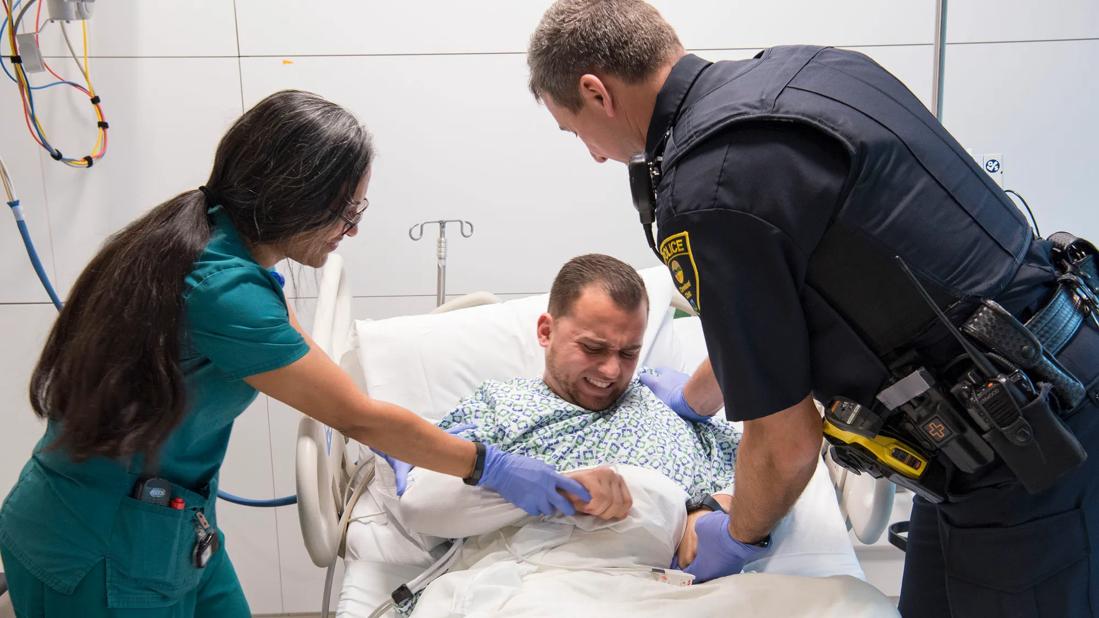Awareness plus action leads to prevention

Workplace violence is something Cleveland Clinic leaders and caregivers take very seriously.
Advertisement
Cleveland Clinic is a non-profit academic medical center. Advertising on our site helps support our mission. We do not endorse non-Cleveland Clinic products or services. Policy
According to Modern Healthcare, per the Occupational Safety and Health Administration (OSHA), incidents of serious workplace violence (those requiring days off) between 2002 and 2013 were four times more common in healthcare than private industry.
Statistics like these are concerning, especially for nurses who have more patient interaction than most other caregivers. Thus, educating nurses on how to navigate the balance between access for patients who need care and personal safety is a top priority of the Stanley Shalom Zielony Institute for Nursing Excellence.
To help educate and train nursing caregivers on workplace violence, leaders of the Nursing Institute partner with other health system leaders, like those from Cleveland Clinic’s Protective Services and Emergency Departments.
Last year, for example, in conjunction with Protective Services, the Nursing Institute held a first-of-its-kind healthcare safety conference, known as SHIELD, to educate frontline caregivers and support staff on social factors that impact safety in healthcare.
The one-day safety event addressed violence in healthcare, disaster preparation, drug epidemics and general security. It also recognized stress points that clinicians, patients and visitors face and provided practical tactics and skills to manage these situations.
The Nursing Institute also has a leading presence on Cleveland Clinic’s Workplace Violence Prevention Committee, which is dedicated to preparing caregivers to recognize, prevent and react to workplace violence. Janet Schuster, Chief Nursing Officer at Cleveland Clinic Lutheran Hospital, co-chairs the committee.
Advertisement
Through a variety of resources, the committee aims to help Cleveland Clinic caregivers recognize and respond to potential workplace violence incidents. Throughout the past year, the committee developed a toolkit containing imperative information on everything from defining workplace violence and prevention tips and techniques to how to de-escalate hostile situations, what to do during and after a violent incident, how to report an incident and more.
Within the toolkit, caregivers also have access to violence prevention resources from The Joint Commission and OSHA as well as Cleveland Clinic’s system-wide workplace violence policy and procedure.
While workplace violence is often more prevalent in settings such as emergency departments and psychiatric units, it can happen anywhere throughout a healthcare organization. To effectively reduce workplace violence, it’s important to heighten awareness of it through education and reporting.
As part of Cleveland Clinic’s workplace violence education and training, caregivers are required to complete a ‘workplace violence prevention’ online training module.
Additionally, the Nursing Institute encourages nursing caregivers to complete added continuing education, such as modules on de-escalating violent behavior on the nursing unit and workplace violence prevention for nurses, as well as courses on Non-Abusive Psychological and Physical Intervention (NAPPI) principals and training. Nurse directors and managers are also provided guidance on how to incorporate workplace violence discussions into team huddles.
Advertisement
Furthermore, Cleveland Clinic offers an online system for caregivers to report alarming incidents. Incident reporting – from near misses to harm events – not only protects and supports caregivers, it also helps prevent future occurrences. In any situation, caregivers should be encouraged to speak up when they observe concerning behavior. In fact, Cleveland Clinic recently launched a new ‘Speak-Up Award,’ which is for caregivers who go above and beyond in reporting workplace concerns.
Healthcare organizations need to focus on taking better care of caregivers so they can take better care of patients. Preparing nursing and other caregivers with the resources they need to keep the work environment as safe as possible reduces the risk of potential violence and injury and allows caregivers to continue delivering empathetic patient care. When it comes to workplace violence, “awareness combined with action leads to prevention.”
Advertisement
Advertisement

Planning continues with critical, patient-focused input from nursing teams

Strengthening care through targeted resources and frontline voices

Embracing generational differences to create strong nursing teams

CRNA careers offer challenge and reward

An unexpected health scare provides a potent reminder of what patients need most from their caregivers

Cleveland Clinic Abu Dhabi initiative reduces ICU admissions and strengthens caregiver collaboration

Veteran nurse blends compassion, cutting-edge transplant training and military tradition to elevate patient care

Embrace coaching and other tips to be a stronger leader